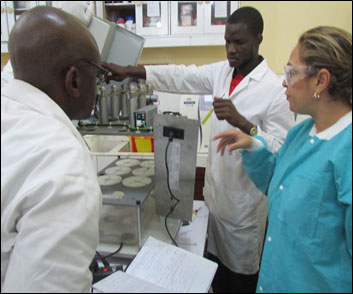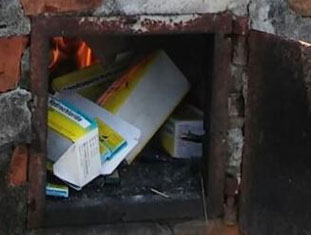
USP/PQM training Liberia laboratory staff on quality control of medicines and maintenance of equipment (Photo: George Alexander, LMHRA Quality Control Lab, Monrovia, Liberia
Medication is an important part of malaria prevention and treatment. However, consuming medicines that have limited or no effect on disease can damage trust in the health care system and may contribute to other health concerns, such as drug resistance
In 2010, the government of Liberia established the Liberia Medicines and Health Products Regulatory Authority (LMHRA) to combat the proliferation of substandard and falsified medicines. LMHRA was born of a collaboration with the Promoting the Quality of Medicines (PQM) program, funded by the U.S. President’s Malaria Initiative (PMI) and U.S. Agency for International Development and implemented by the U.S. Pharmacopeial Convention.
LMHRA created a quality control laboratory (QCL) to test medicines, a registration department to ensure registration of imported medicines, and an inspectorate for post-marketing surveillance of medicines.
Since LMHRA’s launch, Liberia has reduced the quantity of poor-quality antimalarials and other medicines entering and circulating in the country significantly. Working with PQM, LMHRA continues to strengthen its ability to identify, recall and destroy poor-quality medicines before they reach the people of Liberia.

LMHRA incinerates banned, poor-quality antimalarials collected from the 17 districts of Nimba County. LMHRA destroyed 27,600 packs of oral AMT and 143 cartons of other poor-quality medicines in September 2017.
In 2010 and 2011, half of the antimalarial medicines sampled by LMHRA were of poor quality and about two-thirds of medicines were oral
artemisinin-based monotherapy medicines (oAMT).The findings prompted LMHRA to recall failed lots and, in collaboration with the Liberian Ministry of Health’s National Malaria Control Program (NMCP), pass a ban on AMT.
Liberia is one of 49 countries to ban AMT. The World Health Organization considers the use of AMT to be a major contributing factor to breeding artemisinin-resistant parasites, and recommends artemisinin-based combination therapy (ACT) for the treatment of uncomplicated malaria cases instead.
In early 2017, LMHRA, NMCP and PQM participated in a nine-day joint post-marketing surveillance exercise in two counties. As a result, more than 200 packs of falsified medications were confiscated. The post-marketing surveillance also identified and removed 82,800 tablets of AMT from the market.
Later in the year, with the support of PQM, LMHRA confiscated an estimated $68,000 USD (over 8 million Liberian dollars) worth of unregistered and falsified products. LMHRA issued citations to five major violators for an administrative hearing, and held a stakeholder’s meeting. Thirty-four awareness campaigns informed Liberians via electronic and print media about the danger of using AMT to treat malaria, the magnitude of substandard antimalarial medicines circulating in the country, and the danger of using falsified products.
Protecting the border
Liberia’s almost 4.7 million people are at risk from poor-quality medicines that stream unchecked across its multiple borders, an increasingly major problem for the health care system in sub-Saharan Africa.
To reduce this, 30 border control security and customs officers at the Ganta-Guinea border were trained to visually and physically inspect medicines. The training used Minilab™, a transportable toolkit that tests medicines for their active pharmaceutical ingredients. The border officers are now able to rapidly detect and confiscate 17 types of falsified and substandard antimalarial medicines.
This has strengthened Liberia’s regulatory capacity by overcoming challenges to test and identify falsified and substandard medicines entering the country, including limited financial and human resources, frequent unavailability of laboratory supplies, and faulty equipment.
Building capacity
With PQM’s collaboration, LMHRA has strengthened and expanded considerably, including growing from three to 48 staff members, improving capacity for key regulatory functions, and obtaining essential laboratory equipment. LMHRA is also working toward ISO 17025:2005 accreditation for its QCL (verification of operating according to international standards), has developed more than 65 standard operating procedures, and continues to build technical analytical competency. These efforts have allowed LMHRA to take more than 140 regulatory actions, including the removal of poor-quality and banned antimalarials from the market.
